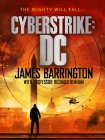Cyberstrike, James Barrington [short story to read .TXT] 📗

- Author: James Barrington
Book online «Cyberstrike, James Barrington [short story to read .TXT] 📗». Author James Barrington
North laughed shortly.
‘I’ve pissed off a lot of people in my career, such as it is, but if somebody wanted to kill me they could take me out with a bullet or a knife or even drive a car into me. And the same applies to O’Brien. There are much easier ways to kill somebody than to do something like this, and using any kind of nanotechnology is really expensive. Scanning electron microscopes are sodding pricey to hire, and lottery money to buy, like over a million quid a pop, and you can’t do anything in this field unless you have access to one of them. A bullet costs a few pence, so that doesn’t make sense.’
‘So how do you think some person unknown did this, then? And more to the point, why did they do it?’
‘Buggered if I know,’ North said.
‘This is an obvious question,’ Angela Evans said, ‘but was Bob O’Brien the only man up at Hereford who was affected?’
‘I was getting to that,’ Dave North said, ‘because that’s the really bad news.’
He reached into his jacket pocket and pulled out a folded copy of the Hereford Times, a weekly tabloid newspaper. He unfolded it, smoothed it out and showed them the headline on the front page – ‘MYSTERY ILLNESS KILLS FOUR AT CREDENHILL BARRACKS’ – and passed the newspaper over to Ben Morgan.
‘We don’t know what’s going on or why it’s happening,’ North admitted, ‘and I’ve no idea if there are any other people at Stirling Lines who are still affected by this thing. The Credenhill Ruperts are running further checks and they’ll let me know if anything pops out of the woodwork.’
Chapter 9
River Thames, London
The oldest police force in England is not, as many people erroneously assume, the Metropolitan Police Service, established by Sir Robert Peel in 1829 with a staff of 1,000 constables and based at 4 Whitehall Place in London. The building had a back door in Great Scotland Yard that was used as the entrance to the police station and eventually the shortened form ‘Scotland Yard’ entered common usage as a synonym for the Metropolitan force. The ‘peelers’, as they quickly became known – the name a nod to the surname of the founder – were modelled on a law enforcement organisation created in Ireland in 1814, again by Sir Robert Peel, a force that morphed into the Irish Constabulary in 1836. Peel is known as the founder of modern policing, and it’s probable that the later nickname ‘Bobbies’ for police officers is derived from his Christian name. But to discover the earliest organised police force in England it’s necessary to look back over thirty years before, to the end of the previous century.
What became known as the golden age of piracy began, broadly speaking, in about 1650 and lasted until the 1730s with pirates and privateers – essentially licensed pirates carrying a ‘letter of marque and reprisal’ issued on behalf of their monarch to authorise their lawless activities against the ships and ports of countries perceived to be enemy states – plying their brutal trade first in the Atlantic and Caribbean and later in the Pacific and Indian oceans. But by the end of the eighteenth century arguably the richest pickings for pirates were to be found a lot closer to the British Isles than the Caribbean Sea, and in many cases there was no need to even bother boarding a boat in order to participate in the trade.
It’s been reliably estimated that in the 1790s the value of the cargoes held on the thousands of merchant ships moored or anchored in the River Thames at any one time typically exceeded £80 million when converted to today’s currency. And, equally typically, river pirates and gangs of dockyard thieves were known to make off with around £50 million worth of that cargo in an average year.
Such massive losses were obviously unsustainable, and in 1798 the Marine Police Force was formed on the instigation of three men – a Scottish magistrate named Patrick Colquhoun, an Essex-based mariner and Justice of the Peace called John Harriott and, as a somewhat unexpected participant, the philosopher Jeremy Bentham – initially with a staff of just fifty officers to police an estimated thirty thousand river and dockside workers.
Against the odds the organisation, based in Wapping High Street, was effective and two years later an act of Parliament – the Marine Police Bill – converted this private police force into a public entity and in so doing created the first uniformed police force anywhere in the world. Almost forty years later, in 1839, it merged with the fledgling Metropolitan Police Force to form Thames Division.
Today, it’s still based in Wapping High Street and is now known as the Marine Policing Unit, or MPU. It’s an elite division within the Met, responsible for the safety and security of about forty-seven miles of the tidal Thames within Greater London between Hampton Court to the west and Dartford Creek to the east. Like all British police forces, the MPU is on duty 24 hours a day and 365 days a year, operating boats of various types from RIBs – rigid inflatable boats – up to 31-foot Fast Response Targa vessels in its patrols of the river.
Just like police officers on land, the crews of the MPU boats are keenly attuned to the traffic they see in their patch, and do not hesitate to intervene when they think it’s necessary, stopping and questioning the crew of any vessel that raises a red flag in their





Comments (0)